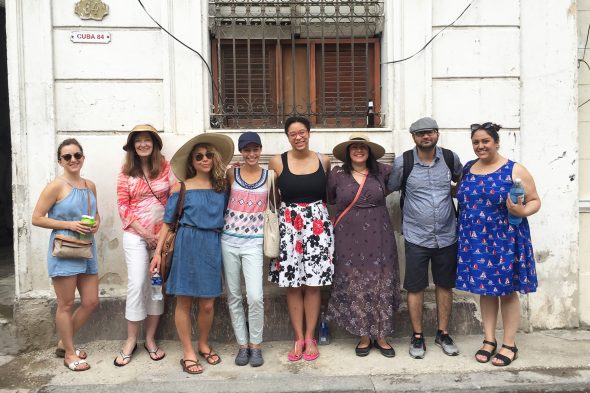School of Public Health course brings students to Cuba
The UIC School of Public Health offered a new elective course this summer that provided graduate students a first-hand look at how Cuba delivers health care and public health programs.
Public Health in Cuba, created in partnership with the Cuban National School of Public Health (ENSAP) in Havana, included in-class instruction at UIC, as well as two weeks of coursework and field visits to health facilities and programs in Cuba. Seven students took the class, which was led by public health faculty members Judith Levy and Nadine Peacock.
The course was designed for students to learn how Cuba, despite having severely limited resources, has evolved into a system of free health care for its entire population at a level of quality on par with most high-income countries, including the United States.
Areas of success include achievement of low maternal and infant mortality, control of infectious diseases, including HIV, a low physician-to-patient ratio, excellence in preventive medicine, and the delivery of efficacious community-based public health programs.
“There’s a lot we can learn from Cuba to help us improve the way we provide care and promote health in this country,” said Alyson Lofthouse, senior associate director of the global health program in the UIC School of Public Health. “Similarly, we maintain knowledge that we can share with our Cuban colleagues.”
Before traveling to Cuba, students spent two weeks at UIC preparing for their visit by learning about Cuba’s health care system through readings and instruction from UIC faculty and guest lecturers. In Cuba, students participated in lectures at ENSAP, and saw the health care system in action by visiting local clinics, hospitals and health-oriented organizations.
“One nice feature of the course,” Levy said, “is that the students were lodged at various ‘casas particulares,’ which are family-run homestays that allowed them to live and experience life in Cuba as members of the local Cuban community.”
Each student selected a special topic to delve into while in Cuba; upon returning to UIC, they presented their findings in a special session for faculty, staff, students, family and friends.
The course is the first at UIC to bring students to Cuba, and UIC is only one of a handful of schools to do so across the nation. In 2015, the UIC School of Public Health and the National School of Public Health in Havana signed a memorandum of understanding to establish a partnership between the two schools to provide research and collaborative learning opportunities. The summer course, as well as faculty academic exchanges, are important outcomes of this partnership.
“We hope to offer this course next summer and to enroll students across the campus,” Peacock said.
The school also intends to again bring Cuban public health researchers from the National School of Public Health to UIC to further share their expertise in providing public health services.

